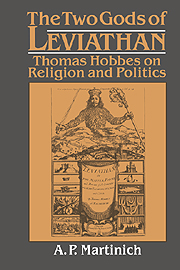Book contents
- Frontmatter
- Contents
- Acknowledgments
- A note on references
- Dedication
- INTRODUCTION
- PART I THE RELIGIOUS BACKGROUND TO HOBBES'S PHILOSOPHY
- PART II LAW, MORALITY, AND GOD
- PART III RELIGION WITHIN THE LIMITS OF SCIENCE AND POLITICS
- Chapter 7 GOD
- Chapter 8 REVELATION, PROPHETS, AND MIRACLES
- Chapter 9 ANGELS AND ESCHATOLOGY
- Chapter 10 THE CHURCH
- Chapter 11 SCRIPTURE
- Conclusion
- Appendix A Curley on Hobbes
- Appendix B Skinner on Hobbes
- Appendix C The frontispiece to Leviathan
- Notes
- Bibliography
- Index
Chapter 8 - REVELATION, PROPHETS, AND MIRACLES
Published online by Cambridge University Press: 30 December 2009
- Frontmatter
- Contents
- Acknowledgments
- A note on references
- Dedication
- INTRODUCTION
- PART I THE RELIGIOUS BACKGROUND TO HOBBES'S PHILOSOPHY
- PART II LAW, MORALITY, AND GOD
- PART III RELIGION WITHIN THE LIMITS OF SCIENCE AND POLITICS
- Chapter 7 GOD
- Chapter 8 REVELATION, PROPHETS, AND MIRACLES
- Chapter 9 ANGELS AND ESCHATOLOGY
- Chapter 10 THE CHURCH
- Chapter 11 SCRIPTURE
- Conclusion
- Appendix A Curley on Hobbes
- Appendix B Skinner on Hobbes
- Appendix C The frontispiece to Leviathan
- Notes
- Bibliography
- Index
Summary
According to Hobbes, there are two classes of religious propositions: those that are amenable to scrutiny by reason and those that are not. The proposition that God exists belongs to the first class. This class is not especially important for the philosophy of religion, since its members also belong to the general class of true propositions. It is issues relating to the second class that will concern us in this chapter.
It is not clear which propositions belong to the second class, which Hobbes calls “the Christian mysteries.” One might expect the doctrine of the Trinity to be a paradigmatic member of this class; it certainly is not provable. However, Hobbes has a theory about the Trinity, which purports to show that it is consistent. That would seem to make the Trinity amenable to scrutiny by reason in a nontrivial sense, and hence a member of the first class. Perhaps he would count propositions such as “The Father generates the Son, and the Holy Spirit proceeds from the Father and the Son” as belonging to the second class. However, the latter proposition is a theoretical statement, dependent upon the scholastic Aristotelianism that Hobbes consistently opposed. Whatever one says about this, there are two points to be made about the Christian mysteries. First, even though they are not demonstrable and may not be comprehensible, nonetheless they do not contradict reason: “For though there be many things in God's word above reason; that is to say, which cannot be either demonstrated or confuted; yet there is nothing contrary to it; but when it seemeth so, the fault is either in our unskilful interpretation or erroneous ratiocination” (EW, 3:360).
- Type
- Chapter
- Information
- The Two Gods of LeviathanThomas Hobbes on Religion and Politics, pp. 220 - 246Publisher: Cambridge University PressPrint publication year: 1992



